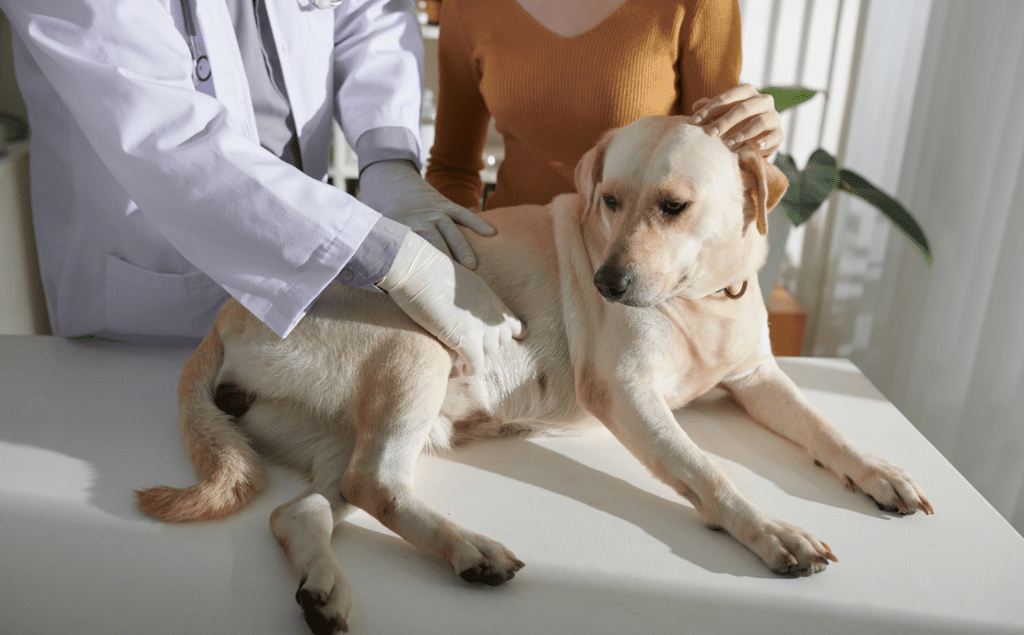Causes of a Dog's Swollen Stomach
If your dog has a swollen stomach, you might not be sure why or what you should do. This is not common, and it can often be a sign of something serious. If you have any concerns about your pet, and they have a swollen stomach, you should take your dog to the emergency vet right away to make sure they get the care they need.
In this article, we will explain the causes and symptoms behind a dog’s swollen stomach, as well as treatment. Read on to learn more about why your dog’s stomach may swell.

Symptoms
If your dog has a swollen stomach, you need to be sure that you look for specific symptoms that will help you to figure out what is causing the problem. The symptoms that go along with your dog's swollen stomach can help to determine what needs to be done to care for them.
1. Ascites
Ascites is a condition where fluid build-up collects in the abdominal area. This is common when your dog has an internal disease such as heart failure, kidney disease, liver disease, and intestinal issues. Late-stage heartworm can also cause this symptom.
Your veterinarian will have to run tests to figure out which of these issues are related to your dog's swollen stomach. There are various symptoms that are associated with all these different diseases, and your vet will look for these common symptoms to identify which condition your dog might have. Treatment will be dependent upon the particular condition that your dog has been diagnosed with.
2. Cushing's Syndrome
Cushing’s syndrome is not a common condition, and it is more likely to impact older dogs. This condition is caused by too much cortisol in the body. This is a stress hormone, and it can cause swelling in the body.
One of the most common places where the swelling will accumulate is in the belly. Dogs that have this condition will also usually eat too much, gain excessive weight, and have trouble with excess water intake and urination. Some dogs will also pace and act anxious, suffer hair loss, and have large fatty deposits on their body.
3. Peritonitis
Peritonitis is an infection that can be caused by a puncture wound in the abdomen or by internal infections. Internal infections can lead to swelling and pain in the abdomen, which needs to be addressed right away. Peritonitis is really serious and requires a visit to the vet right away.
Surgery is usually required to handle this kind of infection, and your dog might only have a few hours before their condition becomes very serious. Peritonitis can also be related to other very serious conditions, which might also be an emergency.
4. Gastric Dilation and Volvulus
This condition is abbreviated as GDV. This is a potentially deadly condition that is caused by the stomach being twisted. The twisted stomach will trap gas and food, and blood flow to the area. This can be fatal within hours, so you should never ignore the chance that this is the reason for your dog's swollen belly.
There is no one single cause for GDV, but sometimes it can be caused by swallowing excess air or from heavy exercise after a big meal. Some breeds are more likely to get this condition as well. Deep-chested dogs and big dogs are much more likely to have this problem than smaller dogs.
You can prevent this condition in most cases by feeding your dog twice a day and by making sure they don't eat too fast. You also should be sure that you don't exercise your dog hard after a big meal. This is particularly important if you have a large dog, and you should always have this in mind if you own a big dog breed.
5. Injury
Injuries can lead to swelling. These injuries do not even have to be injuries to the abdomen. Trauma around the middle of the body can lead to internal swelling, which will tend to collect at the lowest point, which is the belly. If your dog has been hit by a car or some other heavy object or has suffered a big fall, you might notice that their belly is swollen. You should make sure to take your dog to the vet if you know that they have been hurt and if you start to see signs of pain and swelling.
Swelling can sometimes indicate major injuries, or it might mean that there is an internal bleed that needs to be attended to. Making sure that your dog is checked out at is a really good idea if your dog has suffered some kind of fall or injury. Even major injuries to the skin can lead to lots of swelling that can require attention from a vet.
Contact EVCC if Your Dog Has a Swollen Stomach
If your dog has a swollen belly, you will want to take them to the vet right away. You will want to be sure that your dog gets checked out so that you don't miss the treatment window for serious health issues. Many of the conditions that cause a swollen belly require surgery or immediate attention from a vet for other supportive care.
A swollen abdomen can be an emergency as well, so make sure that you call your nearest emergency vet right away. It is always better to be safe than sorry if your dog has a swollen belly, and you will want to be sure that you do not wait too long to get your dog help.
For more information, or if you would like to schedule an appointment, contact EVCC by calling one of our locations. We deliver exceptional emergency care to pets and are here 24/7 to help you and your dog.
Recent Posts
About Us
At Emergency Veterinary Care Centers (EVCC), we know that pet emergencies are unpredictable and often stressful. That's why our team, with over 20 years of emergency and critical care experience, is ready to assist you and your pet in the toughest situations.


